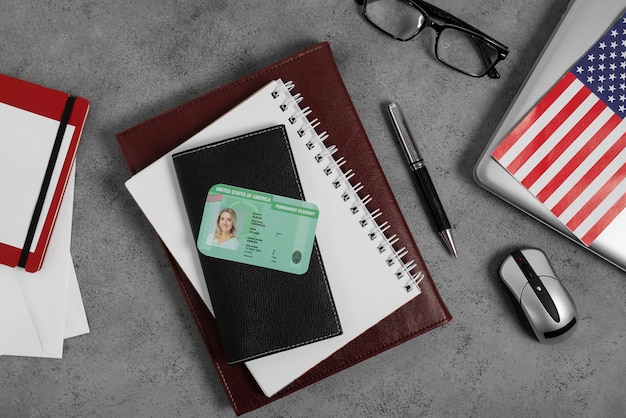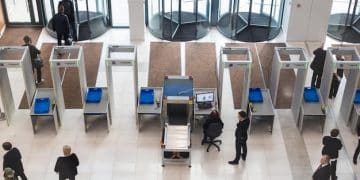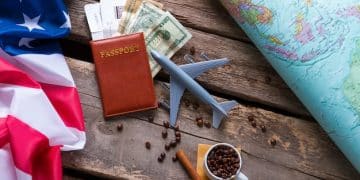US Border Crossing: What’s New This Quarter?

US border crossing requirements have seen several changes in the last quarter, impacting travelers regarding documentation, health regulations, and new technological implementations for smoother entry processes.
Navigating the **US Border Crossing Requirements: What’s Changed in the Last Quarter?** can be a confusing process for both seasoned and novice travelers. This guide provides a clear overview of the latest updates to ensure a smooth and compliant entry into the United States.
Understanding Updated US Border Crossing Requirements
The landscape of **US border crossing requirements** is constantly evolving. To ensure a trouble-free entry, it’s crucial to remain informed about the latest updates. This section covers what you need to know regarding documentation and other prerequisites.
Essential Travel Documents
Having the correct documentation is the cornerstone of a successful border crossing. Always confirm that your documents are valid and up-to-date before beginning your journey.
Here’s what you need to know:
- Passport Requirements: A valid passport is generally required for entry into the U.S. for all air travelers.
- Visa Information: Depending on your country of origin, a visa may be required in addition to your passport.
- Trusted Traveler Programs: Enrollment in programs like Global Entry can expedite your passage through customs and immigration.

These updates ensure better security and more streamlined procedures for legal entry. Always verify your documentation against the CBP’s official guidelines to avoid any unexpected hiccups.
Changes in Health and Safety Protocols
In recent times, health and safety protocols have become integral to international travel. This section outlines the current health-related requirements for crossing the US border, aiming to keep all travelers and communities safe.
Overview of Current Health Mandates
Be aware of any health advisories or mandates that might be enforced at the border. These can change rapidly due to global health circumstances.
- Vaccination Requirements: Check if proof of vaccination is required. Some nationalities can have new rules, so plan accordingly.
- Testing Protocols: While testing requirements have largely been eased, keep an eye on local requirements.
- Quarantine Regulations: Familiarize yourself with the latest quarantine rules which might affect your immediate plans upon entry.

Remember that complying with these health measures not only ensures your entry but also contributes to the overall safety and health security. It is essential to consistently monitor the CDC and DHS for any updates.
Technological Advances at US Borders
Technology is increasingly playing a pivotal role in enhancing border security and streamlining the entry process. This section explores the latest tech innovations that travelers should be aware of.
Automated Passport Control (APC)
Automated Passport Control kiosks are becoming more prevalent at major airports, allowing travelers to expedite the entry process. They can be used by US citizens, Canadians, and eligible Visa Waiver Program visitors.
Mobile Passport Control (MPC)
MPC is a free app that allows travelers to submit their passport and customs declaration information on their smartphone or tablet, saving time in line. Availability is limited to specific ports of entry, so confirm its acceptance at your entry point.
These tech-driven solutions provide a more efficient and secure process for everyone involved, facilitating quicker entry while maintaining robust security standards.
Visa and ESTA Updates
For many travelers, understanding the nuances of visa requirements and the Electronic System for Travel Authorization (ESTA) is vital. This section will cover recent updates and changes that could affect your travel plans.
Recent Changes to Visa Policies
Visa policies are subject to periodic adjustments based on geopolitical factors and diplomatic agreements. Stay informed on any modifications that may impact your visa application or validity.
Here are few points regarding the same:
- Application Process: Confirm if there are any changes to the application forms, required documentation, or processing times.
- Validity Periods: Pay attention to any adjustments in the permitted duration of stay or the visa’s overall validity.
- Visa Types: Be aware of any newly introduced visa categories that may better suit your travel purposes.
Staying informed about these updates is critical, as any oversight can result in delays or denial of entry. Always double-check with the US Department of State for the most accurate and current visa information.
Customs and Declaration Changes
Navigating customs regulations can be complex. This section breaks down the recent changes in customs and declaration requirements that travelers need to be familiar with, ensuring compliance and avoiding penalties.
Understanding New Declaration Requirements
When entering the U.S., you are required to declare any items acquired abroad. Be sure to understand what needs to be declared to stay compliant.
Here are some key things to understand:
- Duty-Free Allowances: Changes to the exemptions on goods you can bring into the country without paying duty.
- Prohibited Items: An updated list of items that are not allowed, such as certain agricultural products or counterfeit goods.
- Cash Declaration: Rules regarding declaring large sums of money (generally, amounts over $10,000).
Compliance with customs regulations helps facilitate smooth entry and avoids penalties such as fines or confiscation of goods. Regularly reviewing CBP’s guidelines can prevent these common issues.
Impact of Geopolitical Events
Geopolitical events can have immediate and significant effects on border crossing requirements. This section analyzes how these events can lead to changes and what steps travelers can take to stay prepared.
Adjustments Based on Global Developments
Global events, such as political instability or international incidents, can prompt immediate changes to border policies. These reactions help ensure the safety and security of the country.
These events can affect:
- Entry Restrictions: Temporary bans or restrictions on travelers from certain regions.
- Security Measures: Heightened security protocols, including additional screenings and checks.
- Policy Revisions: Rapid policy changes in response to evolving geopolitical scenarios.
Travelers should stay abreast of current events and be prepared for potential disruptions or changes to their travel plans. Regularly consulting government advisories can provide timely and essential information.
Tips for a Smooth Border Crossing
To ensure a hassle-free experience at the US border, thorough preparation is essential. This section provides some practical tips to help streamline your crossing process.
Preparing for Your Crossing
A little planning can significantly reduce the chances of delays or complications at the border. Here’s what you can start doing now:
- Document Checklist: Create a checklist of all required documents, ensuring they are valid and easily accessible.
- Pack Smart: Pack in a way that allows for easy inspection of your belongings, if required.
- Be Honest: Always provide truthful answers to CBP officers and avoid any misrepresentation.
Following these tips not only simplifies your individual crossing but also contributes to the efficiency of the overall border operation. It’s about respecting the process and being prepared.
| Key Aspect | Brief Description |
|---|---|
| 🛂 Documentation | Passport, visa (if required), and other necessary travel documents must be current and valid. |
| ⚕️ Health Protocols | Check for any health-related mandates, like proof of vaccination or recent testing requirements. |
| 📱 Technology | Leverage APC kiosks and the MPC app to streamline your border crossing. |
| 💼 Customs | Be aware of duty-free allowances and declare all items acquired abroad to comply with customs regulations. |
Frequently Asked Questions (FAQ)
▼
Generally, a valid passport is required. Depending on your nationality, a visa or enrollment in Trusted Traveler Programs like Global Entry may also be necessary. Always check the latest guidelines from CBP.
▼
Health protocols can change rapidly. Verify if proof of vaccination or recent testing is required. It’s essential to consult the CDC and DHS websites for the most up-to-date information.
▼
Automated Passport Control (APC) kiosks and the Mobile Passport Control (MPC) app can expedite the entry process. These options allow you to submit information digitally, saving time in line.
▼
You must declare any items acquired abroad, including gifts and purchases. Be aware of duty-free allowances and ensure you comply with cash declaration rules. Always provide truthful information.
▼
Geopolitical events can lead to entry restrictions, heightened security measures, and policy revisions. Stay informed about current events and government advisories to prepare for potential disruptions.
Conclusion
Staying informed about the ever-changing **US Border Crossing Requirements: What’s Changed in the Last Quarter?** is crucial for a smooth and compliant entry into the United States. By keeping up with the latest documentation, health, and technological updates, travelers can minimize potential delays and ensure a hassle-free experience.





